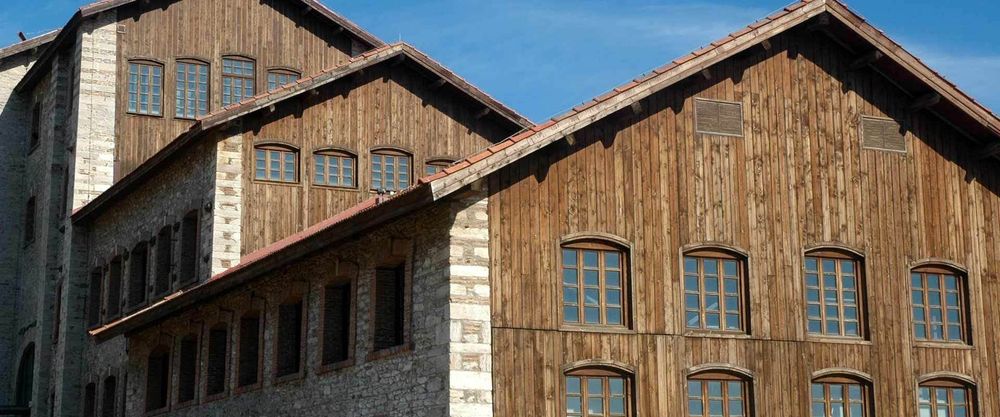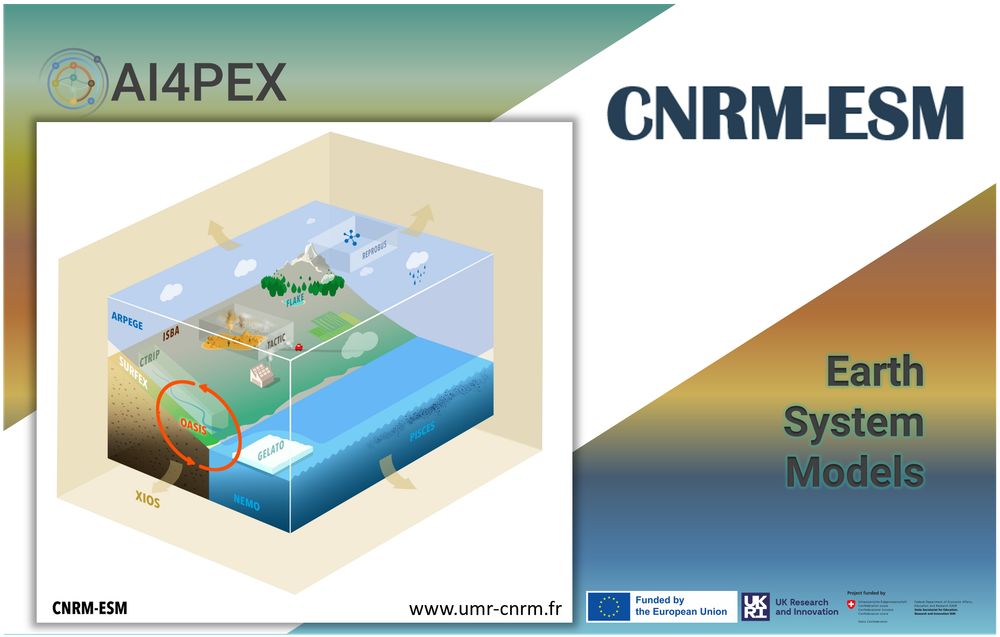
💡 New Paper!
Deep learning can predict runoff — but uncertainty matters.
This study shows that engression + LSTM delivers:
✅ Better uncertainty estimates
✅ Realistic time-series simulations
✅ Stronger performance
for trustworthy environmental forecasts.
👉 Learn more: buff.ly/NYL9dRP
10.02.2026 13:01 — 👍 0 🔁 0 💬 0 📌 0

💡 New Paper!
New hybrid approach for cloud parameterizations in climate models 🌍☁️
Physically consistent ML + practical tuning improves ICON cloud biases by ⬇️ 75% (Southern Ocean) ⬇️ 44% (subtropical stratocumulus)
Interpretable, stable — and robust under +4 K warming.
👉 Learn more: buff.ly/Is6KPrJ
03.02.2026 13:00 — 👍 2 🔁 0 💬 0 📌 0
Postdoc position -- Machine Learning for Earth-Systems Modelling | Universität Tübingen
Are you excited about earth systems modelling, climate research, and machine learning? Join us as a
#AI4PEX postdoc position available at @unituebingen.bsky.social developing #MachineLearning approaches to improve #EarthSystemModels!
👉Join our team: buff.ly/stIFCpw
#Postdoc #ClimateResearch #ResearchOpportunity
23.01.2026 11:00 — 👍 1 🔁 0 💬 0 📌 0

📢 Last Call for Abstracts #EGU26 !
🌊 Join us and submit your abstract to our session OS1.5: Machine Learning and Ocean Modelling for the Earth System
👉 buff.ly/JJQBYzj [https://buff.ly/JJQBYzj]
convened by Thomas Wilder, Anna Sommer, Said Ouala & Adam Blaker.
‼️ Abstract Deadline: 15 Jan 2026
14.01.2026 10:31 — 👍 1 🔁 0 💬 0 📌 0


🙏 Thank you for the overwhelming interest in the Winter School!
Following our recent ELLIS endorsement, together with support from ELLIOT & ELIAS, (and a blip in the EU Survey server 🙃) we’re extending the application deadline!
📅 New deadline: 2 January 2026
buff.ly/uH1iKGM
#AI4EarthSystem
15.12.2025 14:24 — 👍 2 🔁 0 💬 0 📌 0


🧩 Meet some of the exceptional challenges tutors guiding the problem-solving sessions of the Joint Winter School “AI for Earth System, Hazards & Climate Extremes” from the National Technical University of Athens (NTUA) and Max Planck Institute for Biogeochemistry @bgc-jena.mpg.de.
🌐 buff.ly/HZcLiTM
10.12.2025 11:01 — 👍 2 🔁 0 💬 0 📌 0

⏳ Counting down to the #AI4EO Winter School — March 16–20 2026, Athens 🇬🇷
AI, climate extremes & collaboration ahead. One week left to register! 👉 buff.ly/HZcLiTM
#AIWinterSchool2026 #AI4PEX #MeDiTwin #ClimateAction #Networking #CINEA
08.12.2025 11:01 — 👍 2 🔁 1 💬 0 📌 1


🎉 Tuesday is social day at the Joint Winter School!
We’ll explore Ancient Lavrion — a UNESCO Tentative World Heritage Site — and end the day with 🔭 Stargazing, 🎶 Greek music and food, and relaxed networking. A perfect mix of science, culture, and connection. 🌙
🔍 More on Lavrion: buff.ly/060qqn0
03.12.2025 11:01 — 👍 2 🔁 0 💬 0 📌 0

Joint Winter School “AI for Earth System, Hazards & Climate Extremes”
🚀 Explore how AI is transforming Earth system science across key environmental and societal sectors: 🌍 Climate 🌦️ Weather 🌱 Land 🌊 Ocean 🌐 Atmosphere 🔥 Extremes 🧩 Social Systems
🛠 Stay tuned!
📍 buff.ly/dOFMhWy
20.11.2025 14:00 — 👍 1 🔁 0 💬 0 📌 0

📣 Exciting update — registration is OPEN for Joint Winter School “AI for Earth System, Hazards & Climate Extremes”!
📅 March 16 – 20 2026
📍 Venue, NTUA, Athens, Greece
🔗 More info and registration: buff.ly/kNH2f5B
#AIWinterSchool2026 #MeDiTwin #CINEA #ClimateResearchNet #earlycareer #PhD
12.11.2025 16:15 — 👍 1 🔁 2 💬 0 📌 0

🎉 Congratulations!
Nuno, Martin, Jake, and Sujan from @bgc-jena.mpg.de were awarded the Thuringian Research Prize for their groundbreaking work on ““Global interactions of carbon and water cycles of ecosystems under climate change, using #ML and #AI to quantify fluxes, stocks, and turnover times.”
12.11.2025 09:00 — 👍 4 🔁 2 💬 0 📌 0

📢 Call for Abstracts #EGU26 🌊
Consider submitting your abstract to session OS1.5: Machine Learning and Ocean Modelling for the Earth System
👉 buff.ly/JJQBYzj
convened by @twilder.bsky.social, Anna Sommer, Said Ouala & Adam Blaker.
Abstract Deadline: 15 Jan 2025, 13:00 CET
#ESM #ML #AI #CINEA
04.11.2025 14:03 — 👍 1 🔁 1 💬 0 📌 0

💡We’re thrilled to announce the Joint Winter School “AI for Earth Hazards & Climate Extremes”!
📍 NTUA Athens | 📅 March 16–20 2026
A week where AI meets climate science. Stay tuned!
#MeDiTwin #AI4PEX #AIWinterSchool2026
31.10.2025 11:02 — 👍 3 🔁 2 💬 0 📌 0
EUMETSAT - User Portal
EUMETSAT User Portal
☁️ 🌍 Cloud alert!
Warming oceans = fewer marine stratocumulus clouds → less sunlight reflected → more warming. Spotlighted in a new #EUMETSAT case study.
These subtle clouds play a huge role in our climate system — but they’re tricky to model.
Check out the full case study here 👉
28.10.2025 14:31 — 👍 1 🔁 0 💬 0 📌 0

Lecture sparked curiosity and engagement in climate research
SMHI's climate research unit invited participants to Research Friday 2025 (that is part of the European Researchers' Night) in Norrköping and online. Students, teachers, and interested parties had…
Amazing time at Researchers’ Night at SMHI 🎉
It was inspiring to see such strong interest from enthusiastic people to learn about modeling, AI, data and clouds☁️🌊🌿
Great collaboration with @optimesm-eu.bsky.social, @tipesm.bsky.social & Climateurope2💡
buff.ly/0ysJ0EC
#ClimateResearch #ESM
21.10.2025 13:15 — 👍 1 🔁 1 💬 0 📌 0

🌍 Earth system models have come a long way. #AI4PEX improves cloud formation, ocean-atmosphere interactions, and biological processes in the carbon cycle to get a better grip on what the future holds and guide policy decisions.
👉 Stay tuned for exciting updates!
#ClimateScience #Innovation #ESM
14.10.2025 10:02 — 👍 0 🔁 0 💬 0 📌 0

💡New paper!
Ocean models often struggle to simulate accurate #SouthernOcean circulation, resulting in unrealistic warm conditions. Check out how Leith viscosity parameterisations in NEMO improves the Antarctic circumpolar circulation to model more realistic #oceantemperatures.
👉 buff.ly/HWCbk71
07.10.2025 14:00 — 👍 2 🔁 0 💬 0 📌 0
YouTube video by EERIE Project
What's a Storyline? (Three different approaches)
🆕 A quick guide to an elusive concept!
💡 #Storylines can help #climate scientists better convey a message and help average people understand the challenges they may face in the future due to #ClimateChange.
▶️ What's a Storyline? (Three different approaches): youtu.be/E0SzovQjQOc
23.09.2025 10:25 — 👍 2 🔁 2 💬 0 📌 0

Traditional #ClimateModels have long relied on physics. What happens when statistics steps in?
Vincent Verjans (@bsc-cns.bsky.social) is testing how statistical techniques can complement predictions from climate models. 📊🌦️
Read more: expect-project.eu/news/hindcas...
#EXPECTproject #HorizonEU
30.09.2025 11:27 — 👍 2 🔁 3 💬 0 📌 0

Bringing Climate Models to Everyone
How AI is making complex data understandable
Climate models can be a challenge to understand, but a new app from the NorCPM-team is using AI to make complex data understandable.
- The idea is that anyone could use it, says Eurico Noleto-Filho, a postdoc with the University of Bergen and the Bjerknes Center. 🧪
bjerknes.uib.no/en/news/brin...
30.09.2025 11:14 — 👍 13 🔁 5 💬 0 📌 1

🌱 IPSL-CM: Paris-built climate–biosphere integration links LMDZ atmosphere, ORCHIDEE land, NEMO ocean, and PISCES biogeochemistry.
Our updates: enhance ORCHIDEE land processes & develop LMDZ-ORC coupling for sharper climate–carbon feedbacks.
#ClimateModel #IPSLCM #ORCHIDEE #ESM
30.09.2025 10:02 — 👍 2 🔁 0 💬 0 📌 0

🇪🇺 EC-EARTH: a European community climate model coupling ECMWF’s IFS atmosphere, NEMO ocean & LPJ-GUESS vegetation.
We’re upgrading LPJ-GUESS land processes and vegetation dynamics to better capture ecosystem–climate feedbacks.
#ECEarth #ESM #ClimateModeling #ClimateScience #LPJGUESS
23.09.2025 10:02 — 👍 2 🔁 0 💬 0 📌 0

🌍🌊 CNRM-ESM: coupling climate physics & ocean biogeochemistry.
Built by Météo-France/CNRM, it couples atmospheric dynamics (CNRM-CM) to NEMO–PISCESv2 ocean module capturing nutrient-plankton-carbon cycles.
Our updates: boost atm. physics, ocean dynamics & carbon–nutrient cycles.
#ClimateModeling
16.09.2025 10:01 — 👍 1 🔁 0 💬 0 📌 0

🇬🇧🌊 UKESM: The UK’s flagship #ESM linking atmosphere, ocean, land & ice with interactive carbon & chemistry cycles.
What we do: upgrade ocean processes in HadGEM & NEMO, enhance JULES land surface, & improve climate–carbon feedbacks.
#UKESM #ClimateModeling #ClimateScience
09.09.2025 10:01 — 👍 2 🔁 0 💬 0 📌 0

🌍🌐 ICON-ESM: Climate modeling on a whole new grid
The first fully coupled #ESM on an icosahedral grid — no pole problem, uniform global resolution & ready for ML-powered #ClimateScience.
What we do: add ML parameterisations & improve JSBACH land processes for more realistic vegetation dynamics.
02.09.2025 10:01 — 👍 2 🔁 0 💬 0 📌 0

🌍 Meet the #EarthSystemModels powering our project!
Over the next weeks we’ll share 5 unique #ESMs — what makes them special, the science they enable, & how we’ll advance them.
🚀 ICON-ESM, UKESM, EC-EARTH, CNRM-ESM, IPSL-CM.
#ClimateModeling #AI4Climate
26.08.2025 10:01 — 👍 3 🔁 0 💬 0 📌 0
Followed by 2.5k on twitter (X): https://x.com/MLEarthSciences
We tweet/retweet papers related to machine learning/data science/deep learning for Earth and Environmental Sciences. Just email your paper details to mlearthsciences@gmail.com
#research #ML
Our interdisciplinary, pioneering HESCOR project at the #UniCologne combines Earth system science, human system modelling, and humanities to explore nature-culture interactions shaping our past, present, and future world.
https://hescor-project.com
🌍 Embracing uncertainty in the science of tipping points & their impacts
🌊 Polar ice sheets, Amazon rainforest, Atlantic Ocean Currents (AMOC)
🔬 Funded by the European Union No.101137601
👇 Follow for latest science, webinars & updates
Professor of Machine Learning in Agriculture at University of Bonn
Working on Explainable ML🔍, Data-centric ML🐿️, Sustainable Agriculture🌾, Earth Observation Data Analysis🌍, and more...
Head of Communication at Bjerknes Centre for Climate Research @bjerknes.bsky.social
Stolt medlem av redaksjonskomiteen for www.varmerevaterevillere.no 2025 + Fagrådet i Kommunikasjonsforeningen
Understanding climate for the benefit of society. BCCR is a collaboration on climate research between the University of Bergen, NORCE, The Norwegian Institute of Marine Research and Nansen Environmental and Remote Sensing Center.
Developing a prototype for a digital twin on geophysical extremes
🇪🇺 HorizonEU project / Led by GEO3BCN_CSIC / Towards #DestinE
FORWARDS will prototype The ForestWard Observatory tonprovide timely and detailed information on European forests' vulnerability to climate change impacts.
Funded by the European Union. Views and opinions expressed are however those of the author(s) only.
Le Laboratoire des Sciences du Climat et de l'Environnement est une Unité Mixte de Recherche UMR 8212 (CEA/CNRS/UVSQ). Membre de l'IPSL et de l'Université Paris-Saclay
#Artificial #Intelligence for #Earth, #Brain, #Social and #Climate sciences • Universitat de València @uv.es
More papers from our team ➡️ http://linktr.ee/ISPUV
GLP is an interdisciplinary network fostering understanding of land systems and generating science-based solutions to local and global land system challenges.
#50YearsOfESA: we're the European Space Agency, keeping you posted on European space activities.
Please see our Privacy Notice: https://esa.int/connectwithus
100 % Raumfahrt. Wir sind die Deutsche Raumfahrtagentur im DLR. 100% space. We are the German Space Agency at DLR. 🚀
Impressum: https://www.dlr.de/de/service/impressum
Datenschutz: https://www.dlr.de/de/service/datenschutz
Coastal Earth Observation Scientist from Canberra, Australia. Using satellite remote sensing 🛰️, open-source geospatial 🔓🗺️, Python + R 🧑💻 and dataviz 🎨 to map the earth through space + time... 🌏
Earth observation scientist, passionate advocate for documentation and process (someone has to be), palaeoclimatologist, python coder and lover of animals, particularly a snuggly pugX who sleeps at my feet while I work.
Earth observation scientist 🛰️ Using open data, programming, ML and GIS to support a sustainable future. Loves a cheeky field trip 🚗☀️🌳🌊
28🇫🇷 Researcher and AI Coordinator at @ignfrance.bsky.social. Interested in unsupervised learning, remote sensing, satellite imagery and scene understanding.
🏳️🌈 he/him
Researcher @gfz.bsky.social & PhD candidate @rptu.bsky.social 🇩🇪
> MSc @UTFSM 🇨🇱 | ex. Researcher @dfki.bsky.social 🇩🇪 & visitor @Inria 🇫🇷
Enjoying research in AI & ML 🤖 | Now, into #AI4EO 🛰️
Marine scientist/science communicator - into oceans, Earth observation, marine conservation, tuna and marine mammals, Greece, sailing and love running up hills
Remote Sensing expert @planetlabs #forest🌳 #LUC #carbon #supplychain | Geospatial Rising Star 2022 | @GoogleDeveloperExpert #EarthEngine, co-founder of geoinclusion and member of @rsategroup #earthobservation #Amazon #Cerrado








































